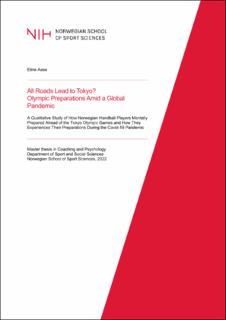All Roads Lead to Tokyo?: Olympic Preparations Amid a Global Pandemic: A Qualitative Study of How Norwegian Handball Players Mentally Prepared Ahead of the Tokyo Olympic Games and How They Experienced Their Preparations During the Covid-19 Pandemic
Master thesis
Permanent lenke
https://hdl.handle.net/11250/3016915Utgivelsesdato
2022Metadata
Vis full innførselSamlinger
Sammendrag
Background: Mental preparation ahead of the Olympic Games (OGs) has been an area of interest for sports psychology researchers over several decades. However, Maher et al. (2020) proposed that there are few studies based on athlete perspectives of their experiences coping with pressure at this competition level (p. 421). The Covid-19 pandemic also placed athletes in a demanding situation as they had to deal with the suspension of sport activity, isolation, and general uncertainty—culminating in the first postponement of the OGs in peacetime. Athletes had to balance coping with everyday life in a pandemic with navigating training in ever-changing conditions, indicating it was particularly valuable to investigate mental preparations ahead of the Tokyo OGs.
Objective: The current study aimed to explore how Norwegian handball players of various experience levels mentally prepared for the Tokyo OGs and how they experienced their preparations during the Covid-19 pandemic.
Methods: Retrospective semi-structured interviews were conducted with seven handball players (four women, three men) who participated in the Tokyo OGs. A reflexive thematic analysis was completed to examine the findings.
Results: Extensive preparations were done on an individual and team level. These incorporated mental, tactical, physical, and practical elements. Individual efforts varied and there were indications of certain team differences. The first OGs appeared to be the most special and experience aided coping with the Olympic environment. Restrictions impacted preparations in some cases, though the teams mostly managed to follow their plans. Nonetheless, the pandemic made the players’ everyday lives unpredictable, which was mentally exhausting for some. They coped with the uncertainties in different ways, though this often entailed focusing on the positive aspects. Overall, the players’ respective contexts affected their perceptions of the pandemic and the postponement of the OGs, and their appraisals of various stressors and subsequent coping strategies.
Conclusion: Both teams prepared thoroughly. The indications of team differences and variations in individual preparations imply that there was no “correct” way to prepare— all roads led to Tokyo. Experience was beneficial in several ways, including coping with the Olympic environment. Some found coping with the effects of the pandemic mentally exhausting, thus potentially affecting preparations. Still, the players got to practice dealing with unexpected events, which could aid future coping efforts.
Beskrivelse
Masteroppgave - Norges idrettshøgskole, 2022
